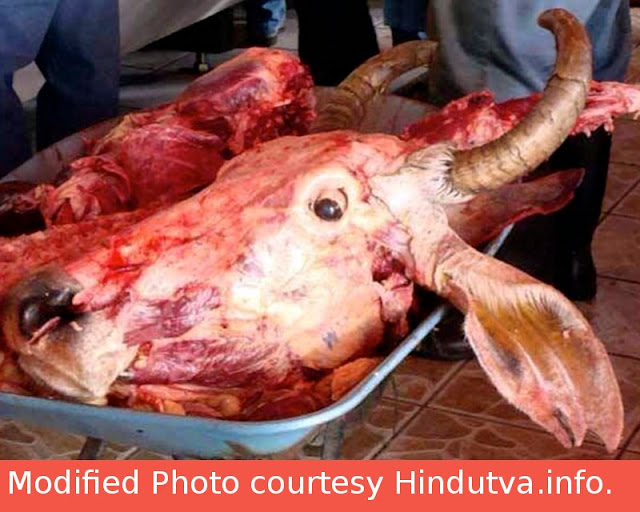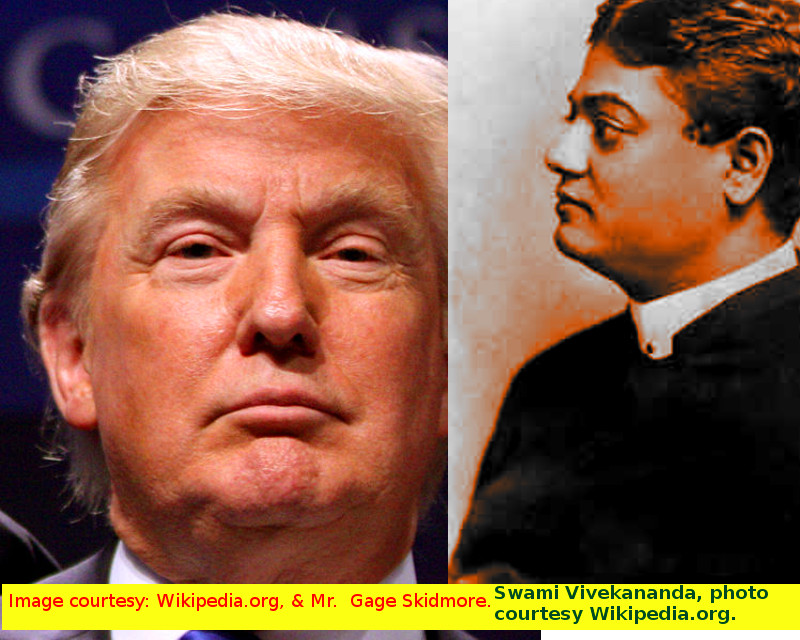Eat meat and write wonderful books
Here is a wonderful view from Sulekha.com:
naresh-sharma.sulekha.com etc..
Blogger's comment
*Q: Is there any link between eating meat and writing wonderful books?
-- Ans: No.
*Q: Suppose, you will lose your ability to write wonderful books if you do not eat meat. Which one will you choose?
-- Ans: It is a personal choice. I shall prefer to lose my ability to write wonderful books. A la Vivekananda , you may prefer to eat meat and write wonderful books. Asinine mediocre blogs will, for the present, work adequately my sub-goals though these asinine blogs may not become wonderful books.
*Q: Does meat eating increase creative abilities or reduce creative abilities?
-- Ans: I have recently read the Complete Works of Sir Arthur Conan Doyle with a penetrating mind. Holmes ate very little. A slice of bread and a little steak or egg. Yet, he was able to make significant logical deductions. He was also able to walk miles with good physical vigor. Thus, there seems to be no link. The (temporary) loss of alert / analytical / creative abilities seem to be more from over-eating which may result in shortage of oxygen and induce sleep / sluggishness. This lethargy may disappear once the food moves along stomach--pancreas--liver-intestine path towards rectum. It is a part of body correction/metabolism mechanism.
*Q: Then do you accept that the Vivekanandan wisdom that India would have produced great Citizens in all fields, if beef continued as an important course on the food court?
--Ans: Vivekananda's wisdom may be true in case of activities requiring physical strength. Nearly 85% of Indians were/are omnivorous. Some of them may probably avoid beef or bacon / pork. Where is India on the Olympic Gold Medals chart? How many scientific inventions these 85% non-vegetarians have made? Though considerable number of Indians are occupying good positions in NASA, American Universities, Silicon Valley, Wall Street etc. what they are contributing is only a secondary innovative work i.e. following along/supporting the inventional threads given by the Team Managers/Project Managers.
Hence it is very difficult to establish a cause-and-effect relationship between food habits and intellectual capabilities /or/ food habits and physical prowess / stamina.
Elephants are herbivorous. Yet, they have great physical prowess. Lions and Tigers are carnivorous. Though they have some physical strength, it is sufficient just to chase and kill its prey. This prowess cannot be harnessed. Buffaloes, bulls, camels, goats and horses are herbivorous. Till 100 years back they were our greatest benefactors. Even now they continue to help us by feeding us with their divine elixir like milk. It, therefore, befits us not to slaughter them and devor them. We ought (ought = moral duty) to look after them when they fall ill with old age or disease. We cannot drive them to abattoirs. The ancient Vedic Indians were apparently settlers from Northern Europe. The Vedic Brahmins were their priests who were a part of their society. That society might have had its special liking for beef both as staple food and sacrificial food. The advent of Buddha might have brought some change in their behavior resulting in evolution of vegetarianism in some castes of India. It has nothing to do with the superiority or inferiority of foods. Those castes which have chosen a veg-path might have done some good to the herbivorous dairy/farm animals.
Q: You say that the herbivorous elephant is strong. Then, why do humans call the carnivorous lion as the king of the forest?
--Ans: Crocodiles, leopards, lions, tigers, wolves etc. have a 'killer instinct'. Their very nature is based on killing as an instinct. I shall ask you one question: Why Indians regard Vivekananda as a builder of the Nation? Why they do not regard Swami Sahajananda Saraswati of the Bihar farm labor movement as a Nation Builder? Both the monks wore red robes. Why crowds thronged when Sathya Sai Baba died and why nobody bothered when Garimella Sathyanarayana died? The key lies in the 'killer's instinct'. The key lies in building organisations which thrive on publicity.
Q: Has vegetarianism done some good or bad to India?
--Ans: What is good or better or bad or worse , is also a question of relativity in terms of manner, place, situation and time. A family which consumes meat daily, when it starts satisfying itself with a ten-day-once meat diet, probably they will be saving 90% of the herbivorous animals on a scale of their past consumption. They will be better citizens, at least in one parameter of human virtuousness. They may be lacking in other parameters. It does not mean that humans are to be unkind persons in every arena every moment. Even one moment of kindness is better than stoniness of whole life.
naresh-sharma.sulekha.com etc..
SM: I agree that it doesn't seem justifiable to kill other living beings and eat them. But if ancient Indians ate meat and wrote wonderful books, then eating meat may not be all that wrong. Gautam Buddha, Ramakrishna and Vivekananda ate meat.
Blogger's comment
*Q: Is there any link between eating meat and writing wonderful books?
-- Ans: No.
*Q: Suppose, you will lose your ability to write wonderful books if you do not eat meat. Which one will you choose?
-- Ans: It is a personal choice. I shall prefer to lose my ability to write wonderful books. A la Vivekananda , you may prefer to eat meat and write wonderful books. Asinine mediocre blogs will, for the present, work adequately my sub-goals though these asinine blogs may not become wonderful books.
*Q: Does meat eating increase creative abilities or reduce creative abilities?
-- Ans: I have recently read the Complete Works of Sir Arthur Conan Doyle with a penetrating mind. Holmes ate very little. A slice of bread and a little steak or egg. Yet, he was able to make significant logical deductions. He was also able to walk miles with good physical vigor. Thus, there seems to be no link. The (temporary) loss of alert / analytical / creative abilities seem to be more from over-eating which may result in shortage of oxygen and induce sleep / sluggishness. This lethargy may disappear once the food moves along stomach--pancreas--liver-intestine path towards rectum. It is a part of body correction/metabolism mechanism.
*Q: Then do you accept that the Vivekanandan wisdom that India would have produced great Citizens in all fields, if beef continued as an important course on the food court?
--Ans: Vivekananda's wisdom may be true in case of activities requiring physical strength. Nearly 85% of Indians were/are omnivorous. Some of them may probably avoid beef or bacon / pork. Where is India on the Olympic Gold Medals chart? How many scientific inventions these 85% non-vegetarians have made? Though considerable number of Indians are occupying good positions in NASA, American Universities, Silicon Valley, Wall Street etc. what they are contributing is only a secondary innovative work i.e. following along/supporting the inventional threads given by the Team Managers/Project Managers.
Hence it is very difficult to establish a cause-and-effect relationship between food habits and intellectual capabilities /or/ food habits and physical prowess / stamina.
Elephants are herbivorous. Yet, they have great physical prowess. Lions and Tigers are carnivorous. Though they have some physical strength, it is sufficient just to chase and kill its prey. This prowess cannot be harnessed. Buffaloes, bulls, camels, goats and horses are herbivorous. Till 100 years back they were our greatest benefactors. Even now they continue to help us by feeding us with their divine elixir like milk. It, therefore, befits us not to slaughter them and devor them. We ought (ought = moral duty) to look after them when they fall ill with old age or disease. We cannot drive them to abattoirs. The ancient Vedic Indians were apparently settlers from Northern Europe. The Vedic Brahmins were their priests who were a part of their society. That society might have had its special liking for beef both as staple food and sacrificial food. The advent of Buddha might have brought some change in their behavior resulting in evolution of vegetarianism in some castes of India. It has nothing to do with the superiority or inferiority of foods. Those castes which have chosen a veg-path might have done some good to the herbivorous dairy/farm animals.
Q: You say that the herbivorous elephant is strong. Then, why do humans call the carnivorous lion as the king of the forest?
--Ans: Crocodiles, leopards, lions, tigers, wolves etc. have a 'killer instinct'. Their very nature is based on killing as an instinct. I shall ask you one question: Why Indians regard Vivekananda as a builder of the Nation? Why they do not regard Swami Sahajananda Saraswati of the Bihar farm labor movement as a Nation Builder? Both the monks wore red robes. Why crowds thronged when Sathya Sai Baba died and why nobody bothered when Garimella Sathyanarayana died? The key lies in the 'killer's instinct'. The key lies in building organisations which thrive on publicity.
Q: Has vegetarianism done some good or bad to India?
--Ans: What is good or better or bad or worse , is also a question of relativity in terms of manner, place, situation and time. A family which consumes meat daily, when it starts satisfying itself with a ten-day-once meat diet, probably they will be saving 90% of the herbivorous animals on a scale of their past consumption. They will be better citizens, at least in one parameter of human virtuousness. They may be lacking in other parameters. It does not mean that humans are to be unkind persons in every arena every moment. Even one moment of kindness is better than stoniness of whole life.
|
Summary: Eating meat or not-eating meat is one shade of the human behavior spectrum, just as 'khaki' is a shade of the windows 256 x 256 x 256 RGB hexa-decimal spectrum. We cannot say that FFFFFF is the best, 000000 the worst and the AAAAAA the optimum. Every shade has its own attraction and value. |



Comments